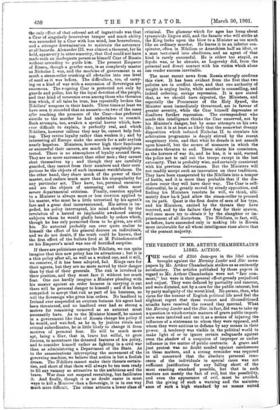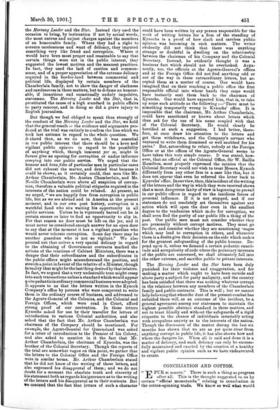THE VERDICT IN MR. ARTHUR CHAMBERLAIN'S LIBEL ACTION. T HE verdict
of £200 damages in the libel action brought against the Morning Leader and Star news- papers by Mr. Arthur Chamberlain strikes us as eminently satisfactory. The articles published by those papers in regard to Mr. Arthur Chamberlain were not "fair com- ment," but were in their general effect grossly prejudiced and unjuat. They were defaced by partiality and rancour, and were dictated, not by a care for the public interest, but by party malignity of the worst kind. No person, then, who cares for the honour of English political life need feel the slightest regret that these violent and ill-conditioned attacks have received the reward they merited. What the Horning Leader and the Star, in fact, did was to take up a question in which certain matters of grave public import- ance were involved and use it as a means of injuring the influence of a statesman to whom they were opposed, and. whom they were anxious to defame by any means in their power. A tendency was visible in the political world to make light of or to ignore certain safeguards against even the shadow of a suspicion of improper or undue influence in the matter of public contracts. A grave and just protest was no doubt needed against carelessness in these matters, and a strong reminder was required to all concerned that the absolute personal inno- cence of the individuals in special cases was not sufficient justification for any falling short of the most exacting standard possible, but that in such matters not merely the fact of evil, but the possibility, and even the appearance of evil, mint be avoided. But the giving of such a warning and the mainten- ance of such a high standard by no means suited the Horning Leader and the Star. Instead they used the occasion to bring, by insinuation if not by actual words, the most untrue and unjust charges against the members of an honourable family. Where they had a right to censure carelessness and want of delicacy, they imputed something very like fraud and corruption. Where it would have been most proper and reasonable to say that certain things were not in the public interest, they suggested the lowest motives and the meanest practices. In fact, they used the lack of caution and common- sense, and of a proper appreciation of the extreme delicacy required in the border-land between commercial and political life, displayed by certain members of the Chamberlain family, not to show the danger of slackness and carelessness in these matters, but to defame an honour- able, if incautious and occasionally unduly impulsive, statesman. The Morning Leader and the Star, that is, prostituted the cause of a high standard in public affairs to party rancour, and in doing so did a grave injury to English journalism.
But though we feel obliged to speak thus strongly of the conduct of the Horning Leader and the Star, we hold that the general result to the evidence and arguments pro- duced at the trial was entirely to confirm the line which we took last autumn in regard to the whole question. We di clared then, as we do now, that it was essential in tee public interest that there should be a keen and vigilant public opinion in regard to the possibility of anything which, though innocent per se, might in future give an opening for corruption or undue influence creeping into our public service. We urged that the honour and bona fides of particular men in particular cases did not exhaust the matter, and denied that because it could be shown, as it certainly could, that men like Mr. Arthur Chamberlain, Mr. Austen Chamberlain, and Mr. Neville Chamberlain were above all suspicion of corrup- tion, therefore a valuable political etiquette required in the interests of the nation could be relaxed. At present, as we urged, "we are happily free from corruption in public life, but as we see abroad and in America at the present moment, and in our own past history, corruption is a watchful fiend who sits waiting his opportunity in all public services. Unless he is vigorously barred out he is certain sooner or later to find an opportunity to slip in. For that reason no door must be left on the jar, and it must never be considered enough answer for an open door to say that at the moment it has a vigilant guardian who would never tolerate corruption. Some day there may be another guardian who is not so vigilant." We also pointed out that unless a very special delicacy in regard to the obtaining of Government contracts marked the actions of the relations of Cabinet Ministers, there was a danger that their subordinates and the subordinates in the public offices might misunderstand the position, and stretch a point in favour of the relative of a Minister, though in reality that might be the last thing desired by that relative. In fact, we argued that a very undesirable tone might creep into such transactions unless a standard which would appear quite pedanticin ordinary commercial business were adopted. It appears to us that the letters written in the Kynoch Company's office by persons who were competent to write them in the ordinary course of business, and addressed to the Agents-General of the Colonies, and the Colonial and Foreign Offices, which were read in Court, afford strong proof of our contention. In these letters Kynochs asked for use by their traveller for letters of introduction to various Colonial authorities, and also asked that the fact that Mr. Arthur Chamberlain was chairman of the Company should be mentioned. For example, the Agent-General for Queensland was asked for a letter of introduction to the Premier of his Colony, and also asked to mention in it the fact that Mr. Arthur Chamberlain, the chairman of Kynochs, was the brother of the Colonial Secretary. Though the reports of the trial are somewhat vague on this point, we gather that the letters to the Colonial Office and the Foreign Office were in similar terms. Mr. Arthur Chamberlain stated that be did not know of the writing of these letters, and also expressed his disapproval of them ; and we do not doubt for a moment the absolute truth and sincerity of his statement both as regards his ignorance as to the writing of the letters and his disapproval as to their contents. But we contend that the fact that letters of such a character could have been written by any person responsible for the work of writing letters for a firm of the standing of Kynoclis is a proof of bow slack and careless public opinion was becoming in such matters. The writer evidently did not think that there was anything strange or doubtful in dwelling on the relationship between the chairman of his Company and the Colonial Secretary. Instead, he evidently thought it was a business fact which should not be overlooked. Appa- rently, too, the officials at the Agents-General's offices and at the Foreign Office did not find anything odd or out of the way in these extraordinary letters, but ac- cepted them as a matter of course. One would have imagined that on their reaching a public office the first responsible official into whose hands they came would have instantly sent them back to the chairman of Kynochs. One would have expected him, that is, to take up some such attitude as the following :—' There must be something temporarily wrong in Kynochs' office. It is impossible that the chairman, Mr. Arthur Chamberlain, could have sanctioned or known about letters which thus ask for the use of his name coupled with that of the Colonial Secretary. He would clearly be horrified at such a suggestion. I had better, there- fore, at once draw his attention to the letters and get them withdrawn, and the Company's servant who ventured to write them dismissed or well snubbed for his pains.' But, astonishing to relate, nobody at the Foreign Office or at the offices of the Agents-General seems to have taken this very simple course. It was stated, how- ever, that an official at the Colonial Office, Sir W. Baillie Hamilton, most properly expressed the opinion that the Colonial Secretary would not wish to treat Messrs. Kynoch differently from any other firm in a case like this, but it does not appear that even he referred the letter back to Kynochs' office. In ourview, then, this incident of the writing of the letters and the way in which they were received shows that a most dangerous laxity of view is beginning to prevail in our public offices in regard to the insidious forces of personal influence. If it is not stopped, and if our statesmen do not resolutely set themselves against any action which will open the door even in the smallest degree to the tendencies which mike for corruption, we shall soon find the purity of our public life a thing of the past. Our public men must not consider whether they are personally without corrupt motives. They must go further, and consider whether they are sanctioning esages which may lead to corruption in others, and whenever there is a doubt give their decision on the side which makes for the greatest safeguarding of the public honour. De- pend upon it, unless we demand a certain pedantic exacti- tude and scrupulosity of code where the pecuniary interests of the public are concerned, we shall ultimately fall into the other extreme, and sacrifice public to private interests.
The Horning Leader and the Star have been duly punished for their violence and exaggeration, and for making a matter which ought to have been outside and above party a subject for party malignity, and the country has been satisfied that there was nothing whatever corrupt in the relations between any members of the Chamberlain family and public contracts. This is well ; but we cannot help believing that when the dust of the present combat has subsided there will, as an outcome of the incident, be a general agreement among our statesmen to maintain the highest possible abstract standard in these matters, and not to trust blindly and without the safeguards of a rigid etiquette to the chance of individuals invariably acting with scrupulous anxiety as to the interests of the nation. Though the discussion of the matter during the last six months has shown that we are as yet quite clear from anything corrupt in public life, it has also shown how and where the dangers lie. When all is said and done it is a matter of delicacy, and such delicacy can only be success- fully maintained and exacted by the creation of a healthy and vigilant public opinion such as we have endeavoured to create.







































 Previous page
Previous page